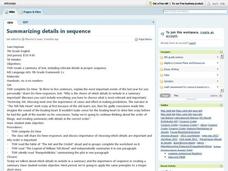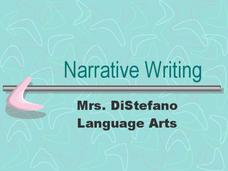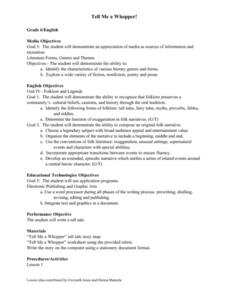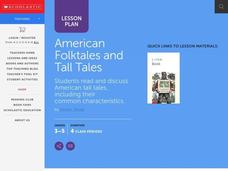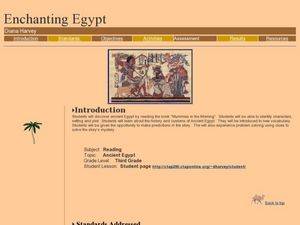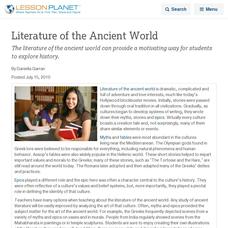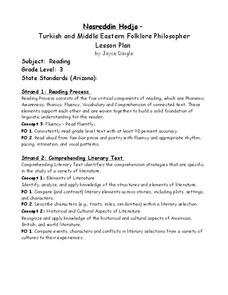K5 Learning
The Fox and the Little Red Hen
Read about the fox family that decides to cook a hen for dinner. After reading, individuals answer questions about the elements of plot in the story. They require drawing conclusions, making predictions, and describing specific parts in...
Curated OER
Mayan Myths/Folktales
Middle schoolers work on summarizing a story, and they determine if it is a legend, a myth, or a fable. Working in groups to read and summarize stories, they then list evidence whether the tale is a myth, fable, or legend. They present...
Curated OER
Fate vs. Mind: A Macedonian Folk Tale
Students read examples of folk tales and describe the characteristics of fables and folk tales. They also examine the concept of fate and if it plays a part in people's lives.
Curated OER
Summarizing Details in Sequence
Seventh graders write a few sentences explaining the most important events of their lives during the past year. As a class, they discuss why they chose the elements they did for their sentences. To end the lesson, they read a variety of...
Curated OER
Shadow Puppetry in South India
Students read a variety of literature from India, including folktales and fables. They then select a scene or story to script, work together to design and craft shadow puppets of characters and scenery, narrate a story, manipulate the...
Tech Coach Corner
Narrative Writing
A comprehensive presentation on narrative writing, this should be shown to a class before the writing process begins. There are not activities listed, so pupils can take notes on the elements of narrative writing and figurative language....
Curated OER
As the Kids Come and Go: Mapping a Classroom
Map the classroom with your kids to help them understand how maps work and how to read them. The lesson starts off with a story about animals living and moving around the globe, and then kids create maps of their classroom to show how...
Bright Hub Education
The Winter of Our Discontent
The resource gives some basic concepts concerning the title of the novel, basic literary elements, student developed assessments, and a philosophical notion concerning honesty in literature. The instructors are shown where they can use...
Curated OER
Tell Me a Whopper!
Sixth graders investigate tall tales as a literary genre. They listen to a number of tall tales to discover how exaggeration is used as a story element. They write and publish a tall tale using word processing software. They illustrate...
Curated OER
Scrapbook of Evidence
Students read three different genres of fiction. They create a story map and brainstorm possible collage inclusions. Each student prepares a minimum of two scrapbook page entries for each text or passage. Students write beside each...
Curated OER
Transforming Fairy Tales
Students use the computer to write, draw, explore the Internet, and combine all of these elements. They write their own fairy tales, use computer software to create drawings of the characters for their tales and use the Internet to...
K5 Learning
Race Cars
Do you ever get nervous before a big event? A pair of race cars discuss their nerves before tomorrow's race in a reading activity that includes five comprehension questions.
K5 Learning
The Best Vacation Ever
Hang ten with a fun reading activity about a family vacation on a cruise. Fifth graders read along as Scott transfers his snowboarding skills to surfing in an engaging reading activity that includes six comprehension questions.
Curated OER
Using Graphic Organizers to Generate Genre Definitions
Students listen to or read a variety of stories and then work individually or in groups to complete graphic organizers that will help them focus on elements within different types of stories. They write definitions for a variety of story...
Curated OER
The Allegorical Jonathan Livingston Seagull
Students write and discuss the definition of an allegory. They read the story, Jonathan Livingston Seagull, and analyze the style and allegorical elements within the story.
Curated OER
American Folktales and Tall Tales
Middle schoolers explore the elements of American folktales. They discuss how they are passed on from generation to generation, how they use exaggeration, and how they convey a message or make a point. Students identify common elements...
Curated OER
Bunyan, Appleseed, and More
Ninth graders listen to a variety of tall tales and compose their own tall tale. In this tall tale lesson, 9th graders complete KWL chart about tall tales. Students discuss the elements of tall tales and then read example tales....
Curated OER
Kissing Coyotes
Fourth graders are read the book "Kissing Coyotes". During the story, they make predictions about what they believe might happen next. After the story, they create their own story using their imagination and draw illustrations.
Curated OER
Myths and Folk Tales
Seventh graders perform research in order to appreciate stories taken from the genre of myths and fables. The examples of the stories create a context for students to create their own myths.
Curated OER
Exploring Folk Traditions and Folk Beliefs
Ninth graders work together to brainstorm an idea to focus on the similiarties and differences between various cultures. Individually, they interview family members using questions they created based on their topic. They use their...
Curated OER
Enchanting Egypt
After reading the Magic Tree House book Mummies in the Morning, learners talk about Ancient Egypt. They identify the plot, characters, setting, etc., explore vocabulary terms, and construct a pyramid. This will motivate your class to...
Curated OER
Literature of the Ancient World
The literature of the ancient world can provide a motivating way for students to explore history.
Curated OER
Narrative Collage
Students use a book or passage for their inspiration to create a narrative collage. They need to illustrate the action or the setting.
Curated OER
Nasreddin Hodja - Turkish and Middle Eastern Folklore Philosopher
Third graders read a readers theater written by Nasreddin Hodja. In this Nasreddin Hodja lesson plan, 3rd graders learn about the philosopher and participate in one of his reader's theaters.





